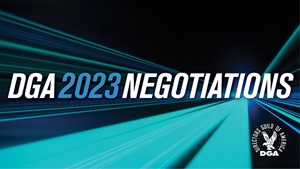
LOS ANGELES, Calif.—The Directors Guild of America (DGA) has reached a tentative agreement on a new three-year collective bargaining agreement with the Alliance of Motion Picture and Television Producers (AMPTP) that the union says achieves major breakthroughs in addressing key global, economic, creative rights, and safety issues.
“We have concluded a truly historic deal,” said Jon Avnet, chair of the DGA’s Negotiations Committee. “It provides significant improvements for every Director, Assistant Director, Unit Production Manager, Associate Director and Stage Manager in our Guild. In these negotiations we made advances on wages, streaming residuals, safety, creative rights and diversity, as well as securing essential protections for our members on new key issues like artificial intelligence – ensuring DGA members will not be replaced by technological advances. This deal would not have been possible without the unity of the DGA membership, and we are grateful for the strong support of union members across the industry.”
“This deal recognizes the future of our industry is global and respects the unique and essential role of directors and their teams as we move into that future,” added Lesli Linka Glatter, president of the DGA. “As each new technology brings about major change, this deal ensures that each of the DGA’s 19,000 members can share in the success we all create together. The unprecedented gains in this deal are a credit to the excellent work, tenacity and preparation of our Negotiations Committee. I am so proud of the phenomenal leadership and dedication of Negotiations chair Jon Avnet, co-chairs Karen Gaviola and Todd Holland and our chief negotiator, national executive director Russ Hollander, and our more than 80-member Negotiations Committee. I’m also incredibly grateful to the DGA staff, who worked tirelessly for the past year and a half to achieve this excellent deal.”
Highlights of the new agreements include:
- Wages and Benefits: Gains in wages and benefits including a 5% increase in the first year of the contract, 4% in the second year and 3.5% in the third year. Additional 0.5% to fund a new parental leave benefit.
- Global Streaming Residuals: Substantial increase in the residuals for dramatic programs made for SVOD by securing a new residual structure to pay foreign residuals. The result is a 76% increase in foreign residuals for the largest platforms so that residuals for a one-hour episode will now be roughly $90,000 for the first three exhibition years.
- Artificial Intelligence: Groundbreaking agreement confirming that AI is not a person and that generative AI cannot replace the duties performed by members.
- Non-Dramatic Programs: Established the industry’s first-ever terms and conditions for Directors and their teams on non-dramatic (Variety and Reality) programs made for SVOD. Improved residuals and for the first time, Associate Directors and Stage Managers will now share in the residuals.
- High Budget AVOD Terms and Conditions: Achieved the industry’s first-ever terms, creative rights protections, working conditions and residuals for scripted dramatic projects made for free to the consumer streaming services such as Freevee, Tubi and Roku. Unit Production Managers and Assistant Directors will share in the residuals.
- Feature Directors: Historic first-time compensation for the months of “soft prep” Feature Directors currently perform for free prior to the start of the Director’s official prep period.
- Episodic Directors: For Pay TV and SVOD, Episodic Directors won expanded paid post-production creative rights; and gained an additional guaranteed shoot day for one-hour programs – the first additional day added in more than 40 years.
- Reduction in Hours: Reduction in the length of the Assistant Director’s day by one hour.
- Safety: Achieved concrete safety advancements including the first-ever pilot program to require the employment of dedicated safety supervisors; expanded safety training programs for both Directors and their teams, and the ban of live ammunition on set.
- In addition to these historic breakthroughs – this agreement also achieved increased Studio transparency in residuals reporting, improvements in diversity and inclusion, the addition of Juneteenth as a paid holiday and many other gains for all categories.
“Every member of our union can be proud of the gains we’ve achieved across the board,” said Russell Hollander, national executive director of the DGA. “Significantly, and for the first time ever, global SVOD residuals will be paid based on the number of international subscribers. The result is an 76% increase in foreign residuals for the biggest services. As our industry becomes increasingly global, these gains are imperative to ensuring our members are valued and compensated for their incredible work.”
Formal negotiations between the DGA’s 80-member Negotiations Committee and the AMPTP began Wednesday, May 10, and were concluded on June 3.
The agreement is not expected to have much effect on the ongoing dispute between the Writers Guild of America, which went on strike against the AMPTP a month ago.
"We congratulate the DGA Negotiating Committee for getting a deal they are recommending to their National Board for approval," the WGA said on Sunday. "Our own bargaining positions remain the same as they were on May 1, 2023."
SAG-AFTRA, which will start negotiations with AMPTP on Wednesday, agreed.
“Our bargaining strategy has never relied upon nor been dependent on the outcome or status of any other union’s negotiations, nor do we subscribe to the philosophy that the terms of deals made with other unions bind us,” said Duncan Crabtree-Ireland, the executive director of SAG-AFTRA, in a statement.
The tentative agreement will be submitted to the Guild’s National Board for approval at a special board meeting scheduled for Tuesday, June 6. Details of the tentative agreement will be released after the agreement has been submitted to the Board.







